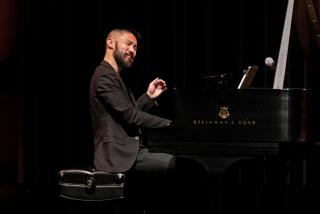THE IMPORTANCE OF PLAYING MODERN
- Share via
New-music specialist Alan Feinberg says he is trying to recapture the urgency and immediacy that characterized performances of an earlier time.
“If you listen to a lot of recordings of great pianists from the earlier part of the 20th Century, one striking thing you’ll hear, besides they’re being so wonderful, is the vitality and imagination in their playing,” Feinberg said in a recent phone interview from San Francisco.
“I think that’s because they were playing in what seemed to be their own language, in their own native tongue.
“Since then, as pieces get recycled, people have become preoccupied with how they’re saying things. The performances often seem faceless, one step removed--almost like a translation, one step removed.”
So Feinberg, 36, has built a career in part by championing new music. Recently heard in four concerts on the New Music L.A. festival, Feinberg will play music by Gyorgy Ligeti, Mario Davidovsky, Milton Babbitt and other new-music masters at 8 tonight at Chapman College in Orange.
“One of the things I like when you’re playing something new is that it feels like your vernacular,” Feinberg said. “Your major preoccupation is to make the communication, not with how fine you’re making it or with how you’re making it in comparison with some recorded version.
“So there’s an immediacy and an urgency of trying to say something, which is one of the things that’s very often missing in a lot of standard repertory recitals--that sense of making the communication.”
Feinberg grew up in Long Island and recalled frequently hearing recitals by Artur Rubinstein, Sviatoslav Richter and Vladimir Horowitz.
“One thing I felt strongly was that these pianists weren’t interchangeable with anyone else,” Feinberg said. “The actual experience of being in a hall, responding to what and how they were playing, was unique.
“And a lot of them were from Europe and championed works of their own generation. For Horowitz, it was Scriabin and Rachmaninoff. For Richter, it was Prokofiev and Shostakovich. Rubinstein premiered an enormous number of contemporary pieces. So for me, it seems really important to belong to your own time period.”
Feinberg, who went to the Juilliard School of Music in New York, described himself as “a fairly normal type of conservatory student,” but a streak of independence began showing pretty early.
“My first professional gig was playing for silent movies (in New York revival movie theaters). I did a score for Chaplin’s ‘The Immigrant’ and the 1920 ‘Mark of Zorro’ (with Douglas Fairbanks Sr.). I wrote, improvised, compiled and stole.
“I always had an interest in slightly different things.”
Feinberg agreed that much of contemporary music is “difficult and complex. But I also think that any number of standard repertory pieces are difficult and complex. Anybody who encounters a late Beethoven quartet for the first time is overmatched, I don’t care how much experience he has.
“I’ve always found it a curious belief, anyway, that people should understand a piece on a first hearing. A lot depends on how much one brings to it.”
Works on his program are “all extremely pianistically conceived,” he said.
“They’re as idiomatic for the piano as any number of pieces from the last century are. In different ways, they each have one kind of high relief.”
More to Read
The biggest entertainment stories
Get our big stories about Hollywood, film, television, music, arts, culture and more right in your inbox as soon as they publish.
You may occasionally receive promotional content from the Los Angeles Times.










